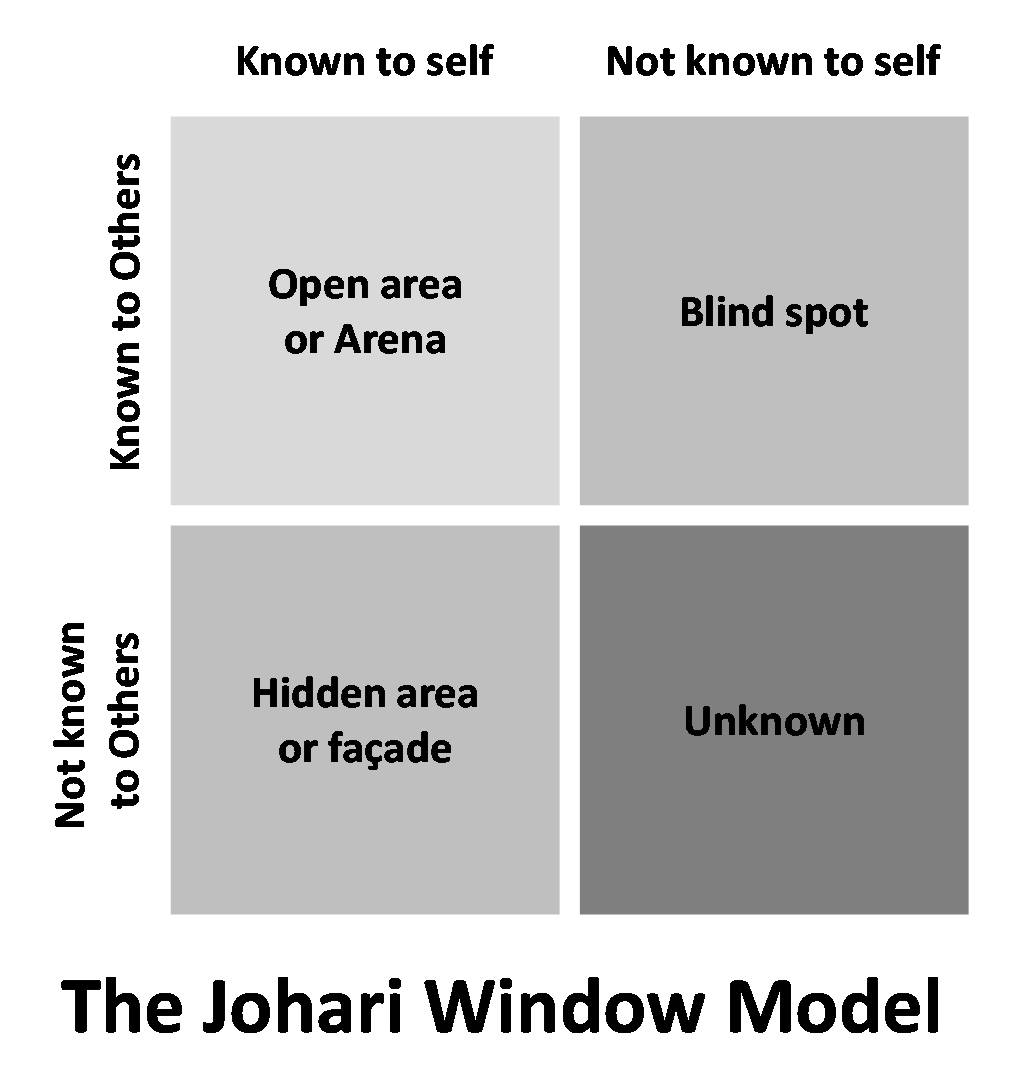
The Johari Window, created by Joseph Luft and Harrington Ingham in 1995, is a psychological method of helping people better understand themselves and others. Each “window pane” shown above conveys different descriptions of an individual.
The Open area is what other people and us describe ourselves. The Blind Spot is what others describe us but we are unaware of it. The Hidden Area is what we think of ourselves but others are unaware of it. The Unknown will be what both parties do not think of us.

My Johari Window
I engaged two individuals to complete a Johari Window model with me. The first person is my classmate, Jia Wen, who I have just met for the first time last week. The second person I have linked up with is my friend of 4 years, Ali. Their Johari Window of me will be different since I have known Ali for way longer than Jia Wen.


The Johari Window with Ali is more accurate than the Johari Window with Jia Wen since Ali mostly likely knows me better. As expected, in the Johari Window with Jia Wen, the Blind Area and Hidden Area have more adjectives than the other quadrants. Whatever Jia Wen thinks of me is her first impression of me by just looking at my physical self since I did not have a proper conversation with her before this. First impressions are always inaccurate because someone’s true self would not be seen that easily by people. That is why the phrase “Do not judge a book by its cover” which means to not judge a person’s worth by its appearance alone, exists.
Many people do not even fully recognise their friends of a few years because most people do not openly show off their true behaviours and personalities. Even though the Johari Window with Ali has more adjectives in the Public Area and Unknown Area as compared to the one with Jia Wen, it seems that there are a lot of things about me that are unknown to Ali and me. Some would argue that an outsiders perspective of you is more accurate since our minds view ourselves as what we want to be seen as. But it could be said that no one knows you better than yourself.

:max_bytes(150000):strip_icc()/family-parents-grandparents-Morsa-Images-Taxi-56a906ad3df78cf772a2ef29.jpg)
Is the Johari Window accurate?
Is the Johari Window an accurate representation of ourselves? For my case, I would say it does to a certain extend. Most people show different sides of them depending on the people they are with. A person can be calm and obedient when they are with family but when with friends, they are wild and energetic. The Johari Window is an accurate representation of ourselves but it varies across different people you do it with.
Are the results surprising?
Since Jia Wen does not know me that well, her perception of me is not surprising, and I would not see it as accurate. I am surprised by some of Ali’s perceptions of me, especially the ones in the Blind Area quadrant. There are a few positive adjectives that Ali has used to describe me in the Johari Window which I most definitely do not see in myself. This may be due to humans nature to be self-critical of themselves. Sometimes, we can act in a positive way that can be seen by others without us realising because we are more focused on our wrongs instead.
Is the Johari Window useful?

The Johari Window is useful for us to be more self-aware. By analysing the Johari Windows made by our peers, we can understand how people view us positively and negatively. We can see what we are lacking and what we need to remove from our personalities. This is particularly useful in a group or team setting. By doing a Johari Window on our teammates, members can indirectly communicate about each other’s strengths and weaknesses. Teammates will also be aware of what they need to work on personally without hurting each other’s feelings. This will result in a boost in morale and productivity in a group.
Conclusion
The Johari might not be a totally accurate method to get to know ourselves but it is effective in giving us an idea about what people think of us and make us more self-aware. It is useful in improving our relationships with others and boosts the morale among each other.
References
(2021). The Johari Window Model. Available at : https://www.communicationtheory.org/the-johari-window-model/
https://www.communicationtheory.org/wp-content/uploads/2013/01/johari-model.jpg
9 responses to “The Johari Window”
-
Hi Arsh!
I really like the formatting of your post! The pictures are colorful and engaging, the different sections are clearly defined. I agree that not everyone would know about our bad side even if he/she know us for years. Therefore, seeing how this Johari Window could help us to better understand our weakness and strength to further improve on our own self. Your explanation of the model is also clear and easy to understand, and your analysis is good.
Great work, this was an entertaining post.
LikeLike
-
Hello Arsh! Great to have come across your blog. I like the colour scheme you have used for the page. It was easy on my eyes to read your explanations and examine your Johari Window Models. I find your comparison of the Johari Windows useful in understanding your perception of first impressions, and how we do not openly show off their behaviours and personalities. I do agree that Johari Window is useful in making us more self-aware. Reading how you were surprised by Ali’s perceptions; I am glad that the Johari Window has helped you in self-awareness. Thanks for sharing!
LikeLike
-
Hi Arsh. Very detailed analysis on the Johari Window done by your friends. The examples you provided helped me to understand the model better. I do agree with you on the fact that no one knows you better than yourself. As individuals, we tend to conceal our true feelings and act in certain ways which we feel is suitable for a situation or setting. As such, it might lead to differences in how others perceive us. As we age, we have a deeper understanding of ourselves, which leads to change. This might affect how we communicate and interact with others. Thank you for the good read.
-
Hey Arsh! So glad I came across your blog post. The amount of different colors you used made blog post look so vibrant and I had a joy reading it. I especially love the layout and the amount of pictures used. Design aside, I really like how everything was simple and easy to understand. Thanks for sharing your results of the Johari Window!
-
Hey Arsh! Your structure is very clear and concise. It was easy to read and understand the explanations of the Johari Window Model. I agree that we tend to show different sides of ourselves depending on who we are with. Also, I agree that the closer your relationship is with the other person the clearer their perspective will be. Your explanation of how first impressions affect their perspective of you was great. Ali’s positive perception of you might be accurate to a certain extent as you may be too critical of yourself. Overall your blog was a good read! Great work!
LikeLike
-
Hello Arsh! It is great to have read your blog post! I really love the way that you have arranged your blog post in a way that it is easy and interesting to read on! I hope that the Johari Window model help you to know and understand youself better! By reading the model, I get to know your personality too! Hope that the model will be able to help you greatly!
LikeLike
-
Hi Arsh! Great blog post with valuable content! 😀 I am so glad to be involved in the model. I indeed enjoyed the session when we did the Johari Window together. Honestly as you have mentioned in the blogpost, my description of you is mainly deducted from our few conversations as well as my first impression of you. Hence, this model really gives us some insightful advice. I guess surely we will know each other better if we share more about ourselves!
-
Hi Arsh. Great post! I absolutely agree that some of our characteristics may change depending on the environment we’re in or the people we’re with. It also changes with mood. For example, some days I’m more energetic and outgoing, other days I’m more quiet and introverted. I also think that it is human nature for an individual to be critical of themselves. An example is that I may not see myself as intelligent or brave but others may think the opposite. Overall, your blog post was pretty educative. You mentioned some things that I thought of but did not manage to put out. Cheers!
-
Hi Arsh, I enjoyed reading your post on the Johari Window Model and I felt that the visuals you utilized did an excellent job of outlining the points that you stated. It was intriguing to read your interpretation of the model and how one should explore the qualities that we do not know we possess. Similar as you, I agree that the Johari Window Model is a helpful device that everyone ought to explore on. Overall, an interesting read and I look forward to your next blog.
LikeLike
Leave a comment